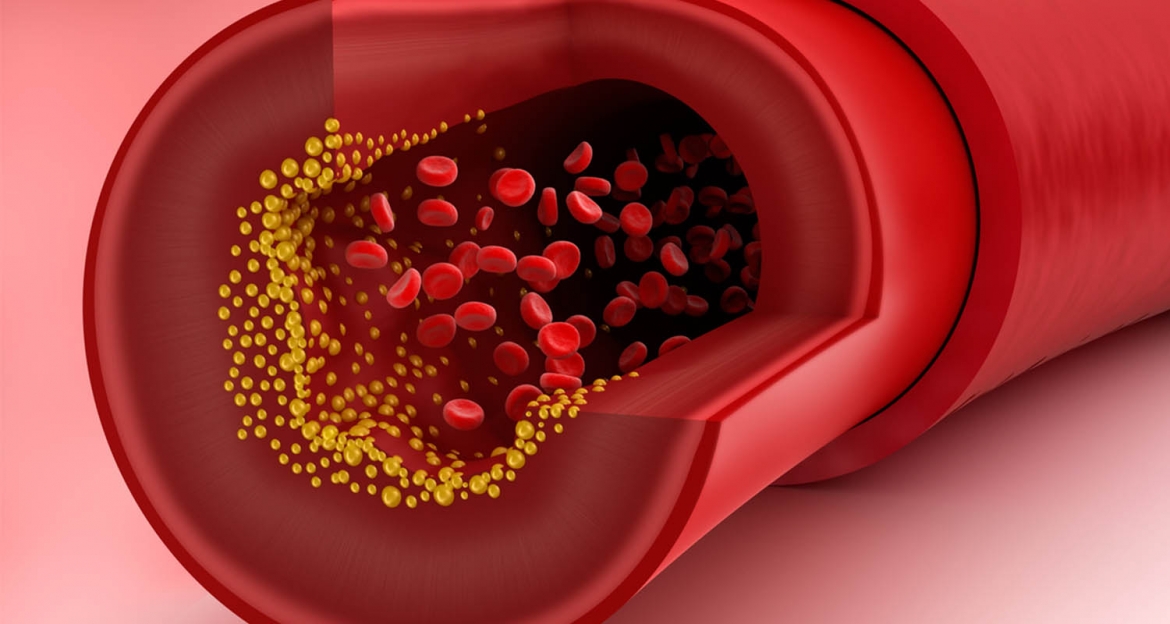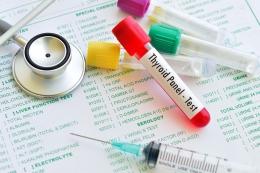Is There A Connection Between Cholesterol Levels And Thyroid Health?
The body comprises of many systems and functions that all need to work together in order to assure survival. Cholesterol and Thyroid health would be an excellent example of how problems with one system in the human body can lead to problems with another function that plays an important role in the body.
Cholesterol is something that many people fear – they hear that eating certain types of food causes cholesterol to accumulate in the blood vessels, ultimately leading to blockages, heart disease, strokes, and, of course, heart attacks. This is why patients are often advised to ensure they keep their cholesterol levels in check, but things aren’t always as simple as switching out certain foods that may lead to an increase in LDL cholesterol levels.
In this post, we are going to take a look at the role that the Thyroid gland and its general function play on the regulation of cholesterol. We will also consider why it is important to keep cholesterol levels in a good balance and consider how patients can determine if their Thyroid’s health might be interfering with their ability to regulate the balance between their LDL and HDL cholesterol better.
Understanding The Impact Of Cholesterol
Cholesterol is a wax-like substance that travels through the blood circulatory system in the human body.
It is classified as a lipophilic molecule1, and even though many people tend to see cholesterol as a bad thing, it is important to take note that cholesterol is a crucial component of human body's survival. Cholesterol is not only found in the blood system, but also all cells in the human body. The substance assists in the functioning of various cells and also assists in the absorption of certain vitamins that are considered fat-soluble. These include vitamin A, vitamin K, vitamin D, and vitamin E.
There are two main types of cholesterol in human body2. These include:
- HDL Cholesterol – This is a “healthy” kind of cholesterol that actually helps to promote better heart health and helps to remove bad forms of cholesterol from the blood circulatory system. Some forms of cholesterol are transported to the liver by HDL cholesterol in order to prevent the build-up of cholesterol in arteries, which may lead to disease. This type of cholesterol is also called high-density lipoprotein.
- LDL Cholesterol – This is the type of cholesterol that patients need to keep an eye on. Often called “bad” cholesterol and scientifically known as low-density lipoprotein, this is the cholesterol that tends to build up in the arteries and cause complications like heart attacks and heart disease. Instead of transporting cholesterol from body tissues and the blood to the liver, LDL cholesterol rather has the opposite effect.
Understanding Thyroid Health And Function
The Thyroid gland sits in the neck, just in front of the voice box, and is responsible for the production and secretion of Thyroid hormones into the blood circulatory system. The two main types of Thyroid hormones to be noted here include Thyroxine (T4) and Triiodothyronine (T3)3. The hormones produced by the Thyroid gland primarily interacts with the body’s metabolism, but really has a role to play in the overall well-being of the body.
The metabolic functions of Thyroid hormones are important for the brain, the heart, and even for bones throughout the body.
Unfortunately, there are cases where disease can affect the Thyroid gland and lead to malfunction. Two of the most common conditions to affect the Thyroid gland include Hyperthyroidism and Hypothyroidism.
Hypothyroidism
Hypothyroidism is a condition that essentially leads to the Thyroid gland becoming underactive. This, in turn, leads to a lower number of T3 and T4 Thyroid hormones being present in the blood circulatory system.
There are two main types of Hypothyroidism that a patient can be diagnosed with with4. These include:
- Primary Hypothyroidism is diagnosed when the patient’s Thyroid gland fails to function properly.
- Secondary Hypothyroidism is diagnosed when there is an insufficient amount of Thyroid-stimulating hormone, also known as TSH, in the body. This hormone is secreted by the pituitary gland. In some cases, the issue may be with the hypothalamus, another gland that is part of the endocrine system, which secretes Thyrotrophin-releasing hormone – this hormone stimulates the pituitary gland to release Thyroid-stimulating hormone.
A number of different potential causes have been associated with Hypothyroidism. Among all the possible causes, autoimmune conditions are considered the most common, especially when a patient is diagnosed with primary Hypothyroidism.
Hashimoto’s disease is a particularly common autoimmune condition that causes the condition. Patients with Hashimoto’s disease have an autoimmune reaction where their immune system mistakenly starts to attack their healthy Thyroid tissue. In turn, the normal functioning of the Thyroid gland is disturbed, leading to a reduced secretion of essential Thyroid hormones.
There are other potential reasons why a patient may develop Hypothyroidism, which may include:
- Patients who previously had been diagnosed with Hyperthyroidism might have been provided high doses of medication, which leads to a suppression of the Thyroid’s function. There are also cases where an adequate dose is provided, but the patient’s body has an over-response to the medication.
- Patients who had undergone a surgical procedure within their Thyroid gland, such as to remove part of the Thyroid gland, are likely to develop Hypothyroidism.
- Radiation therapy is another potential risk factor for this particular condition. When a patient undergoes radiation therapy for the treatment of cancer that affects their neck or head region, the Thyroid gland may be damaged in the process.
- There are also certain cases where medication may cause a patient to develop Hypothyroidism. A number of different medication types have been linked to an increased risk for this condition, such as the use of lithium-based drugs.
There are some rare cases where Hypothyroidism is also caused by congenital diseases, pregnancy, a deficiency in iodine within the body, or a disorder that affects the pituitary gland. While rarer than the above-mentioned causes, it is still important for patients to understand these possibilities.
Hyperthyroidism
Hyperthyroidism is really the opposite of Hypothyroidism. While patients with Hypothyroidism will have a reduced level of Thyroid hormones in their body, those with Hyperthyroidism rather experience an excess level of these hormones.
A number of potential causes have also been linked to Hyperthyroidism, with Graves’ disease probably being the most common. This is also a type of autoimmune disorder. Unlike Hashimoto’s disease, however, Graves’ disease is known to stimulate the Thyroid gland, which leads to excessive production of Thyroxine, or T3, hormones.
Other possible causes for the development of Hyperthyroidism may include:
- A condition is known as Thyroiditis, where the Thyroid gland starts to become inflamed. This is quite common following pregnancy, but may also be caused by a type of autoimmune reaction. Once inflamed, Thyroiditis usually causes excess amounts of Thyroid hormones that are usually stored within the tissue of the Thyroid gland to leak into the patient’s blood circulatory system.
- Thyroid nodules that are considered to be hyperfunctioning may also lead to the excessive secretion of Thyroid hormones into the blood circulatory system. There are three types of hyperfunctioning Thyroid nodules that may affect a patient, including Toxic Multinodular Goiter, Plummer’s disease, and Toxic Adenoma.
How Thyroid Health May Affect Cholesterol Levels
While Thyroid hormones are mostly associated with metabolism, patients often do not understand that the body depends on these hormones for the creation of cholesterol as well. In addition to helping the body make cholesterol, Thyroid hormones also ensure the body is able to get rid of excess cholesterol that is not needed. This is exactly why problems with the Thyroid gland can lead to issues with cholesterol levels.
TSH, a type of hormone that stimulates the Thyroid gland to produce hormones, is known to be altered in the presence of a Thyroid disorder. In one study5, scientists found that when elevated, TSH can actually have a direct impact on cholesterol levels already.
When Thyroid hormone levels changes, this can have a further effect on the balance of cholesterol levels. It has been found that patients with Hypothyroidism tend to have higher levels of LDL cholesterol. This is because their bodies do not have enough Thyroid hormones to effectively break down cholesterol and ensure excess LDL cholesterol is removed from tissues and their bloodstream.
On the other end, patients with Hyperthyroidism tend to have lower levels of cholesterol. Even though this may sound beneficial due to the potential adverse effects that high cholesterol may have, it is important to understand that cholesterol still plays crucial roles in the body’s ability to survive and function normally.
Signs Of Thyroid-Related Problems
The symptoms experienced in the presence of a Thyroid-related problem depends on the specific condition that has developed. Thus, it is important that patients understand the symptoms of both Hyperthyroidism and Hypothyroidism. At the same time, it would also be useful to understand how the patient’s cholesterol has been altered. When cholesterol levels are high, it might be a good idea to look out for signs of Hypothyroidism. If cholesterol levels are low, on the other hand, then the patient should try to identify signs of Hyperthyroidism.
Symptoms associated with Hypothyroidism include:
- Fatigue is very common, along with tiredness
- Muscle weakness
- Horseness
- Patients may start to gain weight without an increase in their daily food intake
- The patient’s skin may become dry
- Hair may start to become thin
- Heart rate may be slower than normal
- Memory function may become impaired
- Signs of depression may start to develop
Patients who have developed Hyperthyroidism may experience the following symptoms:
- Unexplained weight loss
- Weight loss occurs without changes to the patient’s food intake or appetite in general
- A rapid heartbeat may occur
- Heart palpitations
- Anxiety and nervousness
- Irritability
- Excess sweating
- Bowel patterns may change
- The patient may become more sensitive to heat
- Fatigue and muscle weakness are relatively common
- The patient may experience problems with their ability to sleep
- Hair may become brittle and fine
- The skin may appear to be becoming thinner
Conclusion
The Thyroid plays an important part in the metabolism and hormones produced by this gland is present in the entire body.
One connection that many people do not realize is between the function of the Thyroid gland and cholesterol levels in their body. With too many Thyroid hormones, cholesterol levels may decline, and the opposite effect may develop with too little Thyroid hormones. Patients with cholesterol problems are advised to be on the lookout for signs of Thyroid-related problems and to undergo appropriate tests so that the right treatment can be provided to them.
References
1 T. Huff, I. Jialal. Physiology, Cholesterol. StatsPearl. 27 Oct 2018. https://www.ncbi.nlm.nih.gov/books/NBK470561/
2 What is cholesterol and how does arteriosclerosis develop? Informed Health Online. 2006. https://www.ncbi.nlm.nih.gov/books/NBK279327/
3 M.A. Shahid, S. Sharma. Physiology, Thyroid Hormone. StatsPearl. 27 Oct 2018. https://www.ncbi.nlm.nih.gov/books/NBK500006/
4 I. Kostoglou-Athanassiou, K. Ntalles. Hypothyroidism – new aspects of an old disease. Hippokratia Quarterly Medical Journal. 2010. https://www.ncbi.nlm.nih.gov/pmc/articles/PMC2895281/
5 F. Wang, Y. Tan, C. Wang, X. Zhang, Y. Zhao, X. Song, B. Zhang, Q. Guan, J. Xu, J. Zhang, D. Zhang, H. Lin, C. Yu, J. Zhao. Thyroid-stimulating hormone levels within the reference range are associated with serum lipid profiles independent of thyroid hormones. The Journal of Clinical Endocrinology and Metabolism. 22 June 2012. https://www.ncbi.nlm.nih.gov/pubmed/22730515













































































Leave a comment